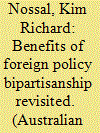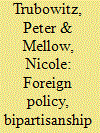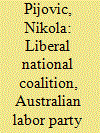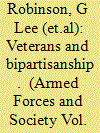| Srl | Item |
| 1 |
ID:
160373


|
|
|
|
|
| Summary/Abstract |
Although foreign policy bipartisanship in Westminster systems is often heralded as a normative good, there is an emerging scholarship which suggests that a bipartisan approach to foreign and defence policy comes with considerable costs. This article seeks to join that debate. It does so by examining two contemporary foreign/defence policy issues in Canadian politics: the mission in Afghanistan from 2001 to 2014 and the efforts to replace the CF-18 Hornet flown by the Royal Canadian Air Force. These two cases do not offer clear conclusions about the normative argument about foreign policy bipartisanship. The embrace of a bipartisan approach to the Afghanistan mission confirms the criticism that bipartisanship can suppress public debate and did indeed distort a consideration of policy options. But the case of the CF-18 replacement suggests that there are significant costs if government and opposition replace a search for bipartisan consensus on key policy issues with an overt politicisation that seeks partisan advantage by ‘playing politics’ with foreign and defence policy issues, concluding that the quality of partisanship is a necessary condition to avoid the dysfunctions and costs of bipartisanship.
|
|
|
|
|
|
|
|
|
|
|
|
|
|
|
|
| 2 |
ID:
105355


|
|
|
|
|
| Publication |
2011.
|
| Summary/Abstract |
The attacks of September 11 and the resulting war on terrorism present a puzzle to conventional explanations of foreign policy bipartisanship. Public anxiety about the international environment increased sharply after the attacks in 2001, but this did not translate into greater foreign policy consensus despite the initial predictions of many analysts. In this article, we advance a theory of foreign policy bipartisanship that emphasizes its domestic underpinnings to explain the absence of consensus in Washington. We argue that bipartisanship over foreign policy depends as much on domestic economic and electoral conditions as on the international security environment. Using multivariate analysis of roll call voting in the House of Representatives from 1889 to 2008, we show that bipartisanship over foreign policy is most likely not only when the country faces a foreign threat but also when the national economy is strong and when party coalitions are regionally diverse. This was the case during the Cold War. Despite concern about terrorism in recent years, economic volatility and regional polarization have made bipartisan cooperation over foreign policy elusive.
|
|
|
|
|
|
|
|
|
|
|
|
|
|
|
|
| 3 |
ID:
146529


|
|
|
|
|
| Summary/Abstract |
The issue of bipartisanship in Australian foreign policy is not often substantially addressed. The country’s relations with the world appear to exhibit strong continuity regardless of the political party in government. And yet, when it comes to engagement with African states and issues, the last two decades have seen highly prominent partisan differences in Australian foreign policy. This article utilises the example of Australia’s foreign policy engagement with Africa to argue that there may be two levels of understanding bipartisanship in Australian foreign policy. On the one hand, aimed at relationships and issues perceived to be of primal and significant security and economic well-being for the country, Australian foreign policy does indeed appear to be bipartisan. However, aimed at relationships and issues that have traditionally been perceived as holding minimal security and economic interest and importance for the country, Australian foreign policy does exhibit partisanship.
|
|
|
|
|
|
|
|
|
|
|
|
|
|
|
|
| 4 |
ID:
173756


|
|
|
|
|
| Summary/Abstract |
Scholars and media outlets that cover the U.S. Congress devote substantial attention to the rise in partisanship and polarization over the past few decades. The steady increases in partisanship and polarization coincide with a comparable decline in veteran representation in Congress. While there are many factors that influence a congressperson’s behavior, an understudied issue is whether these trends suggest that veterans are more likely to exhibit bipartisanship than their nonveteran colleagues. Using two different measures of bipartisanship, this article draws on data from 12 different Congresses to examine whether veterans are more likely to be bipartisan than nonveterans. Utilizing difference in means tests, the results provide only modest evidence that increasing veteran representation would lead to more bipartisanship when controlling for generational differences. This article suggests a research agenda to further assess these findings and discusses the implications of increasing veteran presence in Congress on civil–military relations.
|
|
|
|
|
|
|
|
|
|
|
|
|
|
|
|